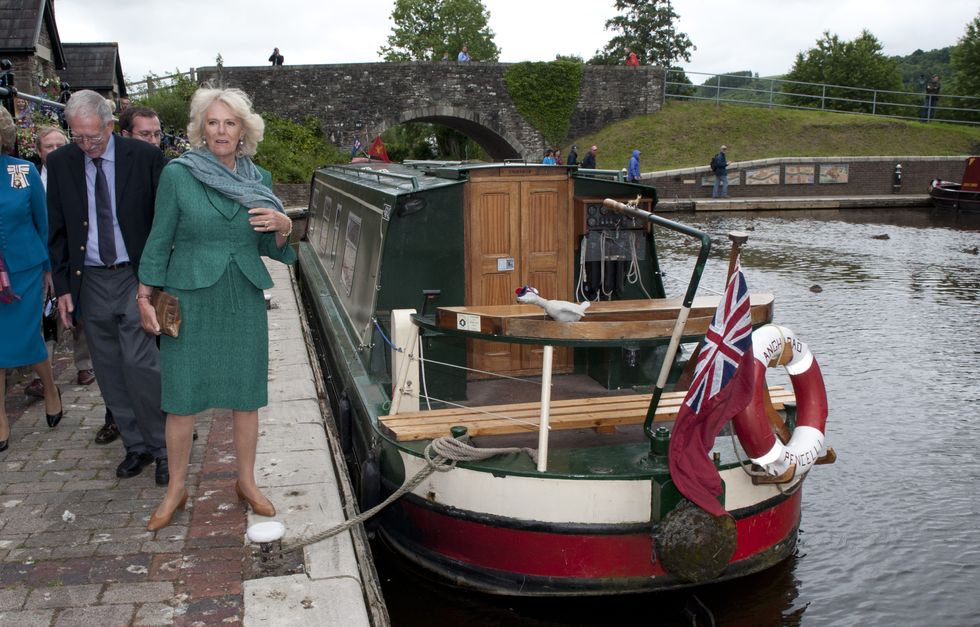‘Lunacy!’ Water company FORCES charity to choose between bankruptcy or extinction of 225-year canal - ‘no sense’
Welsh Government urged to step in and save historic and idyllic waterway
Don't Miss
Most Read
Trending on GB News
A water company has sparked fury after charging a charity ‘unsustainable’ sums for water to prevent a historic and idyllic canal from extinction.
The 225-year-old Monmouthshire and Brecon Canal, which relies on taking water from the River Usk near Brecon, is at risk of running dry after an unprecedently dry Spring.
The Canal and Rivers Trust - the charity who manage the canal - want to increase the water supply from the Usk, but Welsh Water- the quango in charge of Wales’ Water - says licenses are now required to divert water, and they come at a heavy price.
The quango has struck a deal with the charity that sees the latter pay up to £100,000 a week to divert water, something the charity says is unsustainable and will damage their ability to repair and maintain other canals in England and Wales.

Camilla, Duchess Of Cornwall Meets Volunteers And Local Residents During A Visit To Mark The 200Th Anniversary Of The Monmouthshire And Brecon Canal, July 2012
Getty
The cost will vary depending on rainfall and river levels, but the Canal Trust has warned that if current dry conditions persist, “it’s likely we’ll be paying as much as £100,000 per week” (£400,000 a month/£4.8million a year).
Richard Parry, the Canal and River Trust’s chief executive, said that it was not “sustainable for a charity to shoulder the full financial burden of this new legislative requirement”.
“The Monmouthshire and Brecon Canal has never before faced such restrictions to its water supply [in 225 years] or had to pay for the water it needs to stay open for the public to enjoy and for the nature that depends upon it to thrive,” he said.
“While this sticking-plaster solution buys us some time, it is unfortunately short-term only. The pressure remains to urgently find a viable long-term solution for the canal.
“We will continue to call on the Welsh government to help secure a more sustainable future for this beautiful canal that brings so much to the area.”

CEO of Welsh Water Peter Perry received nearly £900,000 in total remuneration in 2021
Welsh Water
Licenses to divert water were brought in to try and protect delicate river systems in Wales when water levels are low.
Atlantic Salmon, which are ‘threatened with extinction in Wales’, use the River Usk and require, cold, fast flowing water to breed.
Welsh Water’s decision to impose charges on the Canal and River Trust has angered locals too.
Jeremy Williams said: “The Monmouthshire and Brecon Canal has been caught up in bureaucratic rubbish due to 'water abstraction' licensing.
“This water [from the Usk] flows in at one end [Brecon] and out the other [near Newport], so borrows the water, rather than extracts it.
“If the Welsh government do not get involved to stop this lunacy the canal will die. This will affect tourism, boaters, wildlife and ruin a beautiful feature that was carved out by hand 200 + years ago, there is no sense to any of it.”
"The Welsh government need to save a little bit of our country from money grabbing companies.”
LATEST FROM MEMBERSHIP:
Narrowboats moored along the Monmouthshire and Brecon Canal at Llangynidr lock in the Brecon Beacons National Park
Getty
A petition calling on the Welsh government to help preserve the canal has obtained 12,035 signatures, meaning ‘the Petitions Committee will consider the petition’ according the Senedd website.
Welsh Water said: “We are pleased to have come to an agreement to support the Monmouthshire and Brecon Canal that covers the cost of providing the water and doesn’t incur additional costs for our customers or put at risk the supply of drinking water over the summer”.
“We will continue to work closely with the Canal and Rivers Trust, Natural Resources Wales and the Welsh government on a longer-term solution that can support the canal beyond the coming year,” it added.
Gavin Bown, NRW Head of Operations for Mid Wales said: "We acknowledge PEDW’s decision to dismiss the Canal & River Trust’s appeal against elements of our decision to issue licences to abstract water from the River Usk to supply the Monmouthshire & Brecon Canal following legislative changes to remove most exemptions from abstraction licencing.
"Regulating water abstraction is a complex, evidence-based process that carefully balances environmental needs with those of local communities. Our priority is to protect the integrity of the River Usk and the Severn Estuary, both designated as Special Areas of Conservation.
"We remain committed to working collaboratively with the Canal & River Trust to ensure water abstractions are managed effectively and sustainably."
In January, Welsh Water raised water bills for most of its customers, with the average annual bill going up from £503 to £639.
The rise is the start of a five-year period of bill increases from Welsh Water, totalling 42% by 2029-30, a blow to Welsh residents struggling in Labour’s cost of living crisis.
The hike sparked fury from Welsh residents as Wales’ waterways continue to be filled with sewage by Welsh Water. The company was fined £90,000 for polluting the Wye in 2024.
Also angering residents is the fact Welsh Water boss Peter Perry takes home up to £892,000 per year, over five times more than the Prime Minister.
In 2021, Perry received the vast figure in salary, pension payments, bonuses and other perks. In 2022, that figure was £675,000 and £792,000 in 2023.
The Monmouthshire and Brecon Canal was originally built in the early 19th century to transport coal, iron, and limestone from the South Wales Valleys to Newport.
Once a vital industrial artery, it is now a scenic waterway popular with boaters and walkers which supports a variety of flora and fauna.
The Welsh Government declined to comment.







